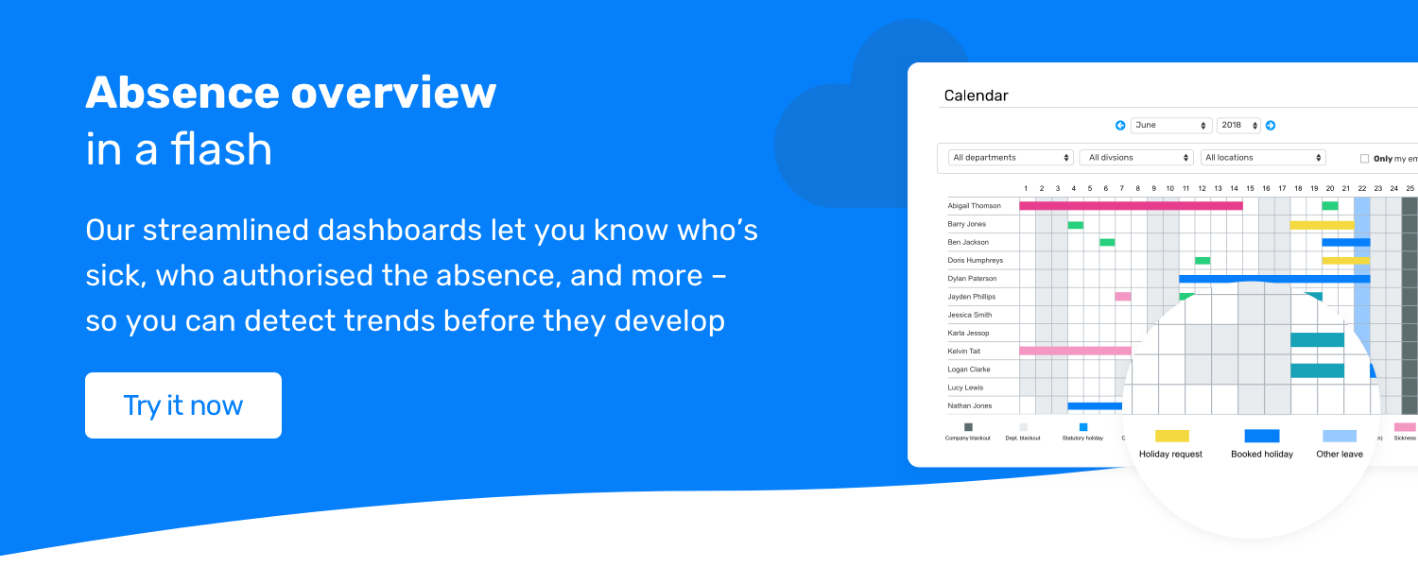Did you know that 57% of all working days in the UK lost to sickness are estimated to be mental health-related? Or that there are 5.53 million disabled people employed in the UK, according to recent data?
This article looks at how HR can provide support for employees in a range of ways, especially when it comes to more complex absence management cases.
Whilst all absences are unique in their own way, we look at the trickier cases – such as the law around disability & sickness, along with how SMEs can support employees with mental health conditions.
We also cover considerations around discrimination claims, especially when it comes to supporting employees with disabilities. And of course, how HR can balance business needs with a people-first company culture.
We spoke to Breathe Partners Sharon Smits, HR Consultant and Julia Durbin, HR Director, both of SYLO Beyond HR for their insights into this complicated topic.
Skip to:
What is classed as a disability?
If someone:
a) has a physical or mental impairment which
b) has a ‘substantial and long-term adverse effect on their ability to carry out normal day-to-day activities’, then they would be considered to have a disability under the Equality Act 2010 – when both conditions apply.
Some conditions are automatically protected under disability discrimination law. These include:
-
Cancer
-
HIV
-
Multiple sclerosis (MS)
-
Visual impairments – for example, if someone is blind, severely sight impaired or partially sighted
Now we’ve covered what’s classed as a disability, we’ll cover how SME HR teams can support their employees who have disabilities, and also those that struggle with their mental health.
Disability & mental health: expert advice for supporting your team
We were interested in how HR teams in small businesses can provide ongoing support for employees - especially those who live & work with a disability or are struggling with their mental health.
And with the cost of poor mental health estimated at £1,652 per employee, per year in the UK, it’s clear this is a real issue.
So, we asked the HR experts at SYLO Beyond HR what SMEs can do to support their staff, beyond those ‘normal’ expected reasonable adjustments.
HR advice for supporting team members with mental health issues
“Reasonable adjustments for mental health reasons can help employers to retain employees, reducing recruitment and training costs,” Sharon Smits, HR Consultant at SYLO Beyond HR advises. “Considering a phased return to work, or shorter working hours can reduce absence and associated costs.
Reasonable adjustments related to the working environment, for example lighting, furniture, or heating can ensure that people at work are well, safe and productive.
So can the provision of extra rest breaks and providing a quiet place to work or relax. Creating a healthy work culture, building mental health awareness and demonstrating a commitment to good practice will show your employees that you take their mental health seriously.
An option to consider in the workplace could be to see if any team members are interested in training as a Mental Health First Aider. This can help your team know they have someone to talk to, and that you take mental health issues seriously.
Mental health issues can be invisible; you may not know if your employee is finding coming to work challenging - putting support in place, so they feel they are able to speak to someone, can be hugely beneficial. This could also include provision of an or access to a counsellor.”
Additional types of support could include periods of unpaid leave, extra support with workload management or even potential job design or redeployment to another department.
Read more about combating mental health discrimination in our blog.
HR advice on supporting team members with a physical disability
Julia Durbin, HR Director at SYLO Beyond HR shares her advice around supporting employees with disabilities.
“Every person is an individual, and if they have a physical disability - that makes them even more unique. It's important to communicate with your employee and find out from them, the best way you can support them. Rather than the possibility of getting it wrong, it is best to ask and really listen to what they are telling you.
Signposting them to additional support is helpful, but that isn't where your responsibilities end. Ensuring equity in the workplace, so that everyone has the same opportunities to grow, learn and excel is the best-case scenario.”
But how should sickness be managed when it relates to a disability?
Managing disability-related sickness absence
We asked Sharon Smits of SYLO Beyond HR if treating disability-related sickness absence the same as other sickness leave could be seen as discrimination.
“Disability-related sickness absence should be recorded separately from other types of absences. However, it’s not uncommon for employers to treat disability leave in the same way as sick leave, even if an employee isn’t unwell but rather absent from work for a disability-related reason. This could include absences for treatment, rehabilitation or assessment.”
Should you discount disability-related absences?
Our expert, Sharon of SYLO Beyond HR confirms it’s advisable to keep disability-related sickness absence separate from absences that might incur sickness triggers.
“Treating disability and sick leave in the same way can expose an employer to a claim for unlawful discrimination. Using the ‘other leave’ function in Breathe to record this absence, is a good way of keeping them separate. It’s also advisable not to count sickness absence related to a disability towards any trigger points e.g. for absence-related disciplinary action or in redundancy selection.”
We know that sickness absence has a huge impact on small businesses. So, we’ve put together some tips on how you can manage (and hopefully prevent) complex sickness absences within your SME – supporting your team as well as your business.
3 key HR tips for managing complex sickness absences
From stress to the importance of clear communication, here’s advice from the HR experts on how SMEs can support their team in more complex areas that can lead to absences.
-
The danger of silent burnout
Julia Durbin, HR Director at SYLO Beyond HR, advises the importance of monitoring burnout to keep it at bay, before it becomes a real problem.
“It’s a good idea to check in with each team member individually on a regular basis to review their work with them and ask them how they are. Being aware of how much you’re asking your team to do can be especially difficult if your team is working remotely. Sometimes you may not be fully aware of how many hours they are working, or how stressed someone is, if they’re not working in close proximity to you.”
A handy reminder from Julia for managers, is to dig a bit deeper than the smiles and “I’m fine’s” in team meetings, where possible.
-
Consider distribution of workload - and stress levels
We all know the feeling of coming back from a much-needed break from work to hundreds of emails (the thought of which could put you off boarding your return flight. One-way ticket, anyone?)
And in some cases, the thought of returning to heaps of work could leave struggling employees feeling worse than they did before their time off. Trying to keep workloads manageable and reasonable for team members (where resources allow) can only help in keeping stress levels down.
“Ensuring that everyone takes holidays, and that cover is in place for them whilst they’re away is crucial,” Julia notes. “This is so that ideally, piles of work aren’t there for the employee when they return. It's important to set realistic expectations for your team and remember to get that work/life balance correct. Not just for them, but for you [in HR] as well.”
Read more about stress and burnout in other Breathe articles.
-
Communication: getting the balance right
When an employee is off work unwell, it’s vital to strike a balance when it comes to communication. You want to support your team member, without overwhelming them.
“It's important to achieve the right balance between checking in with [the employee] and contacting them too often,” Sharon notes.
“As an employer, we have a duty of care to look after our people even when they are being looked after by professionals. We suggest arranging a regular time to check in with them, either by phone or text, this is proactive and shows you care. Agreeing that you'd like a response, even if it's ‘I don't want to speak at the moment’ to confirm they are OK. Encouraging them to ensure they are receiving the support they need, either through their doctor or a specific professional in that particular area is also advisable."
And what about flexible working – can this be a way of supporting employees?
Does flexible working count as a reasonable adjustment?
“Some flexible working options may be considered reasonable adjustments, like starting earlier or later due to rush hour. However, if your employee is asking for flexible working as a reasonable adjustment, they should inform you of that and include it in their request,” Julia notes.
“Talking the request through with them and giving them the opportunity to explain why they need to make a flexible working request, sharing information about their condition and how it affects them, ensures the best decision for everyone.
Employers do not have to agree to all requests for adjustments, but keeping the lines of communication open and explaining why a particular adjustment may not be possible, would be helpful for them to understand.” Julia, SYLO Beyond HR.
Overall, the main thing is to maintain your people-first culture as much as you can within your SME. Talk to your people and find out what type of support they need from you – every absence case & individual is different.
Balancing business needs with a people-first company culture
Times are tough for small businesses - especially in the current economy. But it’s never been more important to take care of your people and support them when they’re not able to work.
“The key to balancing business needs with a good company culture is communication,” Sharon of SYLO Beyond HR advises.
“If a business fails, then everyone suffers. Acknowledging individual needs, when it comes to mental or physical health, and creating an environment where both the employee and the business are working together to ensure the best possible scenario for all concerned is important. This can help to keep the balance of business & individual needs in equilibrium.”
Streamline your absence management with Breathe. You can trial ‘other leave’ functionality for free, for 14 days.
Sharon Smits is HR Consultant & Julia Durbin is HR Director at SYLO Beyond HR.
SYLO Beyond HR is a Gold Breathe Partner.

Author: Aimée Brougham-Chandler
An IDM-certified Digital Copywriter (2023) & English Language & Literature graduate (BA Hons), Aimée is Breathe's Content Assistant. With 3 years' content marketing experience, Aimée has a passion for writing - and providing SME HR teams with solutions to their problems. She enjoys delving into & demystifying all things HR: from employee performance to health and wellbeing, leave to company culture & much more.







